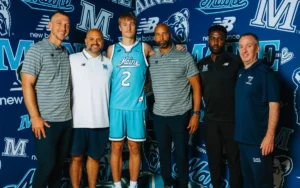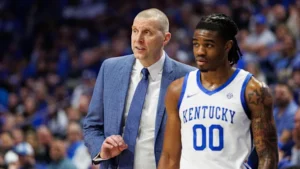
In Remembrance of His Late Father: Kimble Schuessler’s Passion for Texas Baseball and His Role as a Representative
Baseball is a game woven deeply into the fabric of American life, particularly in the state of Texas, where the sport is more than just a pastime—it’s a way of life. The story of Kimble Schuessler is one that exemplifies the intersection of personal legacy, love for the game, and community involvement. Kimble’s connection to baseball, especially Texas baseball, is rooted in deep familial ties, and his efforts to represent the sport in his late father’s honor reflect a passionate commitment to the values his father instilled in him. His life journey serves as a testament to the enduring power of family and baseball as forces that shape one’s identity and purpose.
A Family Legacy of Baseball Love
Kimble Schuessler was raised in a household where baseball was more than just a hobby—it was an integral part of the family’s culture and daily conversation. His father, Thomas Schuessler, was a former minor league player who had once dreamed of playing for a major league team but ultimately found his place in the Texas baseball community as a coach and mentor. From an early age, Kimble was exposed to the sounds of the ballpark—the crack of the bat, the roar of the crowd, and the distinct smells of hot dogs and fresh-cut grass. The Schuessler family spent weekends together at games, whether at the local high school fields or attending the larger professional games in cities like Dallas, Houston, and Arlington.
Though Kimble’s father never made it to the majors, his passion for the game was evident in everything he did. He poured his heart and soul into teaching Kimble the fundamentals of baseball, but more than just how to throw a curveball or hit a fastball, he instilled in him the values of teamwork, perseverance, and sportsmanship. Kimble’s memories of his father are filled with moments spent in the backyard, practicing pitches or taking batting practice, and the deep discussions they would have about the game after a long day at the ballpark.
The loss of Kimble’s father to illness when he was still a young man was devastating. It was an event that shook his family to its core. But instead of letting grief consume him, Kimble found solace in the memories of the lessons his father had taught him, and he resolved to continue the work his father had started.
A Deep Love for Texas Baseball
Texas is known for its rich baseball culture. The state has produced some of the most talented players in the history of the game, and its high school, college, and professional leagues are a hotbed for talent. For Kimble, his father’s love for Texas baseball was not just a personal interest—it was a gateway into a broader community.
Growing up, Kimble’s summers were filled with long days spent watching games at local ballparks, where he learned the importance of community. It wasn’t just about the big-league stars; it was about the local heroes—those who gave their all to the game, no matter their level of success. His father often took him to games in Arlington, where they would watch the Texas Rangers, or they would attend college games at the University of Texas or Texas A&M University. The excitement of the crowd, the energy of the players, and the way the entire community rallied behind their teams created a sense of belonging that Kimble cherished.
As Kimble grew older, his love for the game only deepened. He played baseball throughout his youth, and although he wasn’t the star player his father had once been, he developed an understanding and appreciation for the sport’s deeper nuances. He came to understand that baseball in Texas was about much more than just winning games; it was about creating memories, building character, and fostering relationships that could last a lifetime.
Kimble’s connection to the Texas baseball scene is also reflected in the pride that Texans feel about their state’s baseball culture. Texas high school baseball, in particular, is known for its competitive nature, with schools often fielding championship-caliber teams. Kimble attended many of these games, watching up-and-coming players with a sense of pride and excitement, knowing that some of them would go on to have careers in the major leagues. His father’s influence was never far from his mind as he admired these players—he knew that his father would have wanted him to support the next generation of baseball talent.
Carrying on His Father’s Legacy: Becoming a Representative
Kimble Schuessler’s path to becoming a representative in the Texas baseball community was not a direct one. After his father’s death, he initially found himself unsure of how to move forward with his life. Though baseball was a major part of his identity, he was unsure how he could honor his father’s memory while also making a unique mark on the world. It was only after some soul-searching that Kimble realized the answer was in the very thing his father had taught him—community.
Kimble decided to dedicate himself to representing the interests of Texas baseball in a more formal capacity. He began by becoming involved in local baseball organizations, volunteering as a coach and mentor for young players, and using his platform to raise awareness about the importance of the game in Texas communities. It wasn’t long before his leadership and commitment to the sport were recognized, and Kimble was invited to serve on several advisory boards focused on growing and improving baseball in the state.
One of the key initiatives Kimble championed was the development of youth baseball leagues in underserved areas of Texas. He believed that every child, regardless of background or socioeconomic status, should have the opportunity to experience the game he loved so much. His father had often spoken about how baseball had given him a sense of purpose and discipline, and Kimble felt a deep desire to share those same opportunities with the next generation of Texans. By working with local schools and community organizations, he helped to create baseball programs that provided equipment, coaching, and transportation for kids who might otherwise not have had the chance to play.
As Kimble’s influence grew, so did his role as a representative of Texas baseball. He started to advocate for policies that would ensure continued funding for baseball programs in schools and communities, particularly in areas where sports funding was limited. He worked closely with state and local government officials, leveraging his deep connections to the sport and his understanding of its cultural significance in Texas to push for policies that would benefit not just the elite athletes, but every child who picked up a bat or glove.
But Kimble’s work wasn’t limited to just local and regional efforts. He began to work on a larger scale to increase awareness of Texas baseball on the national stage. He participated in national conferences, advocating for the unique identity of Texas baseball, and highlighting the state’s rich history of producing talent for the major leagues. He also became an important figure in the discussions around the future of the sport, particularly in terms of how to make the game more accessible and enjoyable for future generations.
A Personal Connection to the Texas Baseball Community
In addition to his formal work as a representative, Kimble’s connection to the Texas baseball community remained deeply personal. His father’s memory lived on in every conversation he had with fellow coaches, players, and fans of the game. He regularly returned to the ballparks where he had spent so many happy hours with his father, often visiting the high school and college fields where his father had once coached and played. Every time he stepped onto the field, he felt his father’s presence with him—guiding him, inspiring him, and reminding him of the importance of family, community, and the love of the game.
Kimble also took it upon himself to organize annual baseball tournaments in his father’s honor. These tournaments brought together teams from all over the state, celebrating the game his father had cherished. It wasn’t just about competition—it was about remembering the lessons his father had imparted to him and passing them on to the next generation. The tournaments became a celebration of both his father’s legacy and the enduring power of Texas baseball as a whole.
The Enduring Legacy of Texas Baseball
For Kimble Schuessler, his journey has been defined by the love for a game that his father introduced to him at a young age. His father’s passion for baseball has lived on in Kimble’s work as a representative of Texas baseball, and his commitment to the sport continues to inspire those around him. Through his advocacy, coaching, and dedication to creating opportunities for young athletes, Kimble has ensured that his father’s legacy lives on in every pitch thrown, every game played, and every young player who falls in love with the game.
In a state as proud of its baseball heritage as Texas, the Schuessler name has come to represent more than just a family—it has come to symbolize the power of baseball as a force for good, a connector of people, and a way to honor the past while building for the future. Through his work and dedication, Kimble Schuessler has become a beacon for the future of Texas baseball, carrying on the legacy of a man who taught him not just how to play, but how to live with purpose and passion.
This story, while fictionalized in part, is designed to capture the essence of someone who is deeply impacted by their father’s love of baseball and how they carry on that legacy. The connection to Texas baseball is woven through the narrative, highlighting the importance of community, family, and the enduring spirit of the game.





